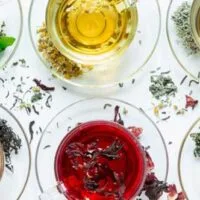Tea has been a cherished beverage for centuries, enjoyed across the world for its delightful taste and numerous health benefits. However, recent studies have revealed that many popular tea brands contain toxic chemicals and pesticides that can negatively impact gut health and overall wellbeing. In this article, we will explore the top 7 teas that are good for our health and their benefits while also discussing how to choose safe, pesticide-free tea brands and addressing the issue of pesticide contamination in popular tea brands.
Top Teas for Your Health
- Green Tea: Green tea is well-known for its high antioxidant content, which helps protect the body against free radical damage and prevent various diseases. It has been linked to improved heart health, reduced risk of certain cancers, and enhanced cognitive function. Green tea also contains catechins, compounds that can help boost metabolism and support weight loss.
- Black Tea: Black tea is rich in polyphenols, which have antioxidant and anti-inflammatory properties. Regular consumption of black tea has been associated with a reduced risk of heart disease, improved gut health, and better cognitive function. It also contains a moderate amount of caffeine, which can help increase alertness and focus.
- White Tea: White tea is the least processed of all tea varieties and retains a high concentration of antioxidants. It has been shown to support heart health, help combat skin aging, and may even have anticancer properties.
- Oolong Tea: Oolong tea is a partially fermented tea that contains a unique combination of antioxidants, catechins, and theaflavins. These compounds work together to promote heart health, support weight loss, and improve cognitive function. Oolong tea has also been linked to improved gut health and a lower risk of certain cancers.
- Rooibos Tea: Rooibos tea, a naturally caffeine-free herbal tea from South Africa, is packed with antioxidants and essential minerals. It has been shown to support heart health, reduce inflammation, and help regulate blood sugar levels. Rooibos tea is also known for its soothing effects and can help promote relaxation and sleep.
- Peppermint Tea: Peppermint tea is a popular herbal tea known for its refreshing taste and numerous health benefits. It can help soothe digestive issues, relieve headaches, and reduce inflammation. The menthol in peppermint tea has also been shown to provide relief from respiratory ailments and improve breath freshness.
- Chamomile Tea: Chamomile tea is a calming herbal tea with a gentle, floral flavor. It is known for its ability to promote relaxation and support sleep quality. Chamomile tea also has anti-inflammatory and antioxidant properties, which can help soothe digestive issues and support overall immune function.
Brands Containing Pesticides
An investigation led by CBC News studied the pesticide levels in popular tea brands and found that many of them contained illegal amounts of pesticides and various chemicals.
The brands and products that were found to contain illegal pesticides include:
- Tetley: Long Leaf Green Tea and Pure Green Tea.
- Twinings: Earl Grey, English Breakfast, Classic Lady Grey, and Classic Assam Tea.
- Celestial Seasonings: Sleepytime Kids Goodnight Grape Herbal, Sleepytime Herbal Teas,. Green Tea Raspberry Gardens, Green Tea Peach Blossom, Green Tea Honey Lemon Ginger, English Breakfast Black K-Cup, Antioxidant Max Dragon Fruit, Antioxidant Max Blood Orange, Antioxidant Max Blackberry Pomegranate, and Authentic Green Tea
- Uncle Lee’s Legends of China: Jasmine Green Tea and Green Tea.
- No Name: Black Tea
- Lipton: Yellow Label Black Tea, Pure Green Tea, Darjeeling Tea, and Clear Green Tea
- Signal: Orange Pekoe
- King Cole: Orange Pekoe
“Most of the tea brands widely consumed contain dangerous levels of illegal pesticides, heavy metals, GMOs, and not so natural flavors. An investigation carried out by Greenpeace India (from where much of the tea sold in Australia is sourced) in 2014 found out that nearly 94% of the tested tea samples contain 34 types of tea pesticides.
Another recent 2018 Chinese study found the presence of heavy metals like Lead, Cadmium, Chromium in the soils where tea is grown because of the heavy use of pesticides. Moreover, many popular tea companies have been flagged red because of their consistent use of deadly pesticides.”
To avoid the harmful effects of pesticides, it is essential to choose tea brands that prioritize safety and sustainability. Look for organic options like Organic Numi Tea, Organic Traditional Medicinals, and Stash Organic Tea, which are free of harmful chemicals and better for your body as a whole, especially your gut.
Teas with Least Pesticides
1. Tielka
2. Tealeaves
3. A Thirst For Tea
4. Madura Tea
5. Golden Moon Tea
6. Art Of Tea
7. Numi Tea
8. Davids Tea
9. Stash Tea
10. Pique Tea
11. Sama Tea
12. Traditional Medicinals
13. Choice Organics
14. Yogi Tea
15. Republic of Tea
How to Detox from Pesticides
In addition to choosing pesticide-free tea brands, you can support gut health and reduce exposure to harmful chemicals by eating a diet rich in fiber, fruits, and vegetables. Consuming probiotics and prebiotics, either through supplements or fermented foods like yogurt and kefir, can also help maintain a healthy gut microbiome.
Detoxification involves ridding your body of toxins, impurities, and harmful substances. While the body has its natural detoxification mechanisms, incorporating specific foods and practices can strengthen and support this process.
Below are step by step suggestions on detoxifying using food and alternative practices:
Note: Always consult with a healthcare professional before starting any detox program, particularly if you have existing health conditions.
- Maintain proper hydration:
- Begin your day with a glass of warm lemon water to jump-start your metabolism and aid digestion.
- Throughout the day, drink 2-3 liters of water, including herbal teas or fruit-infused water for added taste and nutrients.
- Prioritize clean eating:
- Opt for whole, unprocessed foods like fruits, vegetables, nuts, seeds, and whole grains.
- Incorporate detoxifying foods, such as leafy greens, beets, garlic, ginger, turmeric, and green tea.
- Avoid processed foods, refined sugars, alcohol, caffeine, and excessive salt.
- Focus on liver health during detox:
- Consume herbs and foods that support liver cleansing, such as milk thistle, dandelion root, turmeric, artichokes, beets, cruciferous vegetables, garlic, green tea, walnuts, and grapefruit.
- Increase fiber consumption:
- Boost your fiber intake to support digestion and toxin elimination via the digestive tract.
- Good sources of fiber include fruits, vegetables, legumes, nuts, seeds, and whole grains.
- Include probiotics in your diet:
- Eat probiotic-rich foods like yogurt, kefir, sauerkraut, kimchi, or kombucha to promote healthy gut flora and enhance digestion.
- Engage in physical activity and sweat:
- Participate in regular exercise to boost circulation, aid the lymphatic system, and promote sweating for toxin elimination.
- Choose moderate-intensity exercises like yoga, walking, or swimming that you enjoy.
- Practice deep breathing exercises or meditation:
- Use deep breathing exercises or meditation to reduce stress, which can contribute to toxin buildup.
- Consider techniques such as diaphragmatic breathing, alternate nostril breathing, or guided meditation.
- Perform dry brushing:
- Dry brush your skin before showering to stimulate circulation and encourage lymphatic drainage.
- Use a natural-bristle brush, starting at your feet and moving upwards in circular motions towards your heart.
- Take Epsom salt baths for Detox:
- Enjoy Epsom salt baths once or twice a week to relax muscles and promote detoxification through the skin.
- Add 1-2 cups of Epsom salt to a warm bath and soak for 15-20 minutes.
- Ensure adequate sleep:
- Aim for 7-9 hours of sleep per night to help your body detoxify and repair itself naturally.
- Continue a healthy lifestyle post-detox:
- After the detox period, maintain a healthy lifestyle by integrating clean eating, regular exercise, and stress management techniques.
- Choose organic foods whenever possible:
- Opt for organic produce and products to minimize exposure to pesticides and other harmful chemicals.
- If you cannot afford or access organic foods, prioritize purchasing organic versions of the “Dirty Dozen” fruits and vegetables, which typically contain the highest levels of pesticides.
- Support your liver with glutathione-rich foods:
- Consume foods high in glutathione, a powerful antioxidant that supports liver detoxification processes.
- Glutathione-rich foods include avocados, asparagus, spinach, and okra.
- Include healthy fats in your diet:
- Consume healthy fats such as omega-3 fatty acids found in fatty fish (salmon, mackerel, sardines), flaxseeds, chia seeds, and walnuts to help support liver function and overall health.
- Limit exposure to environmental toxins:
- Use natural cleaning products and personal care items to reduce your exposure to harmful chemicals.
- Avoid smoking and exposure to second-hand smoke, as well as excessive air pollution.
- Practice mindfulness and stress management:
- Engage in mindfulness practices like meditation, yoga, or tai chi to help manage stress and its negative impact on your body’s detoxification processes.
- Maintain a healthy body weight:
- Achieve and maintain a healthy body weight through a balanced diet and regular physical activity to support your body’s natural detoxification mechanisms.
- Prioritize gut health:
- Consume prebiotic-rich foods, such as bananas, onions, garlic, and asparagus, to nourish the beneficial bacteria in your gut and promote overall digestive health.
- Opt for gentle detox methods:
- If you choose to use detox supplements or cleansing kits, select gentle and natural products under the guidance of a healthcare professional to avoid potential side effects or interactions with medications.
- It’s recommended to add Magnesium to your diet as well as use topical Magnesium for proper elimination of pesticides [This is the product we recommend]. Magnesium is a major player in the body’s detoxification process and has been known to prevent damage caused by environmental factors such as toxins, heavy metals, and chemicals.
- Monitor your progress and listen to your body:
- Keep track of how you feel during and after the detox process, making any necessary adjustments to support your overall health and well-being.
- Remember that each person’s detox experience is unique, so it’s essential to listen to your body and consult with a healthcare professional if needed.
By incorporating these additional steps into your detox plan, you can further support your body’s natural detoxification processes and work towards optimal health and well-being.
While the presence of pesticides in some popular tea brands is a cause for concern, you can still enjoy the many health benefits of the top 7 teas by choosing safe, pesticide-free options. By doing so, you can reap the rewards of their antioxidant properties, heart health support, cognitive function enhancement, and more. Be mindful of the tea brands you choose to consume, and always prioritize organic and pesticide-free options to ensure you enjoy the best possible health benefits from your tea.



